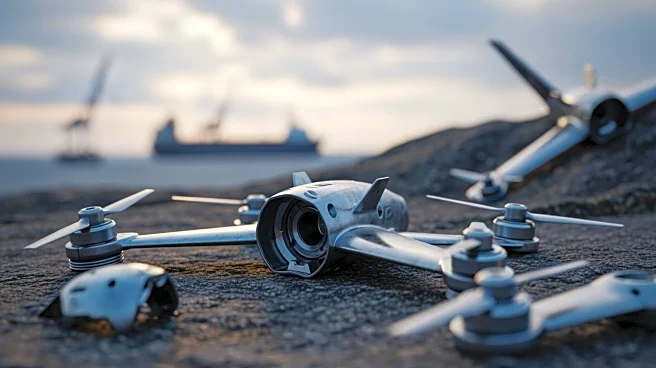What's Happening?
The Romanian Ministry of Defense has reported the discovery of possible drone fragments within Romania's southeastern border region following Russian strikes on Ukrainian Danube River ports. The incident occurred overnight, with Romanian radars detecting
groups of drones near the NATO country's airspace shortly after midnight. Due to adverse weather conditions, fighter jets were not deployed, but military teams managed to recover drone fragments approximately 5 kilometers inside Romania's border with Ukraine. This marks a continuation of frequent breaches of Romania's airspace by drones, as Russia targets Ukrainian ports across the border. Officials have noted that the samples collected from the sites where drone fragments were found are similar to those used by the Russian army.
Why It's Important?
The discovery of drone fragments in Romania highlights the ongoing security challenges faced by NATO countries due to Russian military activities near their borders. These incursions into NATO airspace expose vulnerabilities within the alliance and increase tensions in the region. The situation underscores the need for enhanced defense measures, prompting Romania and Poland to deploy new weapons systems to counter the threat of Russian drones. The frequent breaches not only put Europe on edge but also raise concerns about the potential for escalation and the broader implications for regional stability and security.
What's Next?
Romania and Poland's deployment of new weapons systems is a direct response to the increased drone activity and aims to bolster their defense capabilities. As NATO countries continue to face security threats from Russian military actions, further measures may be taken to strengthen airspace protection and ensure regional stability. The situation may also prompt discussions within NATO regarding collective defense strategies and the allocation of resources to address emerging threats. Additionally, diplomatic efforts may be intensified to address the underlying tensions and seek resolutions to prevent further escalation.
Beyond the Headlines
The frequent breaches of NATO airspace by Russian drones raise ethical and legal questions about sovereignty and the rules of engagement in international conflicts. The situation also highlights the technological advancements in drone warfare and the need for international regulations to govern their use. Long-term implications may include shifts in defense policies and increased investment in anti-drone technologies, as countries seek to protect their airspace and maintain security.

















